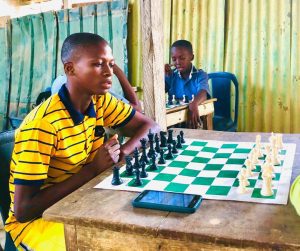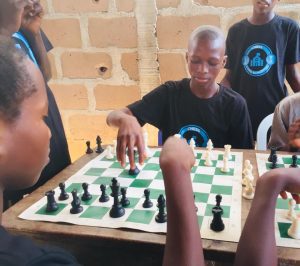In 2022, Celestine Ebuka, 13, had a social anxiety disorder otherwise known as social phobia, as a result of bullying, abuse, or teasing he suffered. Sadly, Ebuka could not express himself freely again or play with his peers until he met Emmanuel Adekunle.
Adekunle is the founder of “Chess to School Initiative,” a Lagos-based nonprofit organisation that supports and trains children from the slums on how to discover their talents through the game.
Ebuka knew nothing about chess, until the initiative provided him the platform. He received intensive coaching and mentoring, describing the game as that of exposure and critical thinking.
“Chess to School has taught me a lot of things, such as critical thinking and how to assess a situation from diverse perspectives,” he said.
Chess to school initiative: Teaching kids to leave
Emmanuel Adekunle, the founder of the Lagos-based nonprofit organisation learnt the game several years ago; and it has transformed the way he thinks. According to him, engaging frequently in chess has reshaped his perspectives about life and ability to unlock his potential.
Similarly, playing the game, he claimed, gives him a positive mental shift and instills a strong sense of duty. “It teaches me how to deal with fear, and peer pressure, and maintain emotional stability.
“So I told myself that if I could teach kids in my neighbourhood how to play chess, I could make a positive difference. This is because the game can help people psychologically, cognitively, and physically,” he said, believing if he could achieve that, it could help children in his area do the same.
Adekunle’s objective since childhood has been to make a difference in his community. He said because most children from Lagos’ slums always feel inferior, the mentality has caused more harm than good as the children are exposed to so many negative influences and acts, which influence their behaviour and the decisions they make.
Finding Ebuka in the slum was the finest thing that could have happened to Adekunle and his colleagues. Adekunle and a team of his instructors engaged the little child in chess through several mental treatment sessions, which helped the little kid overcome his worries and anxiety.
After a few months, this young guy was able to overcome his phobias, and he is now social. He plays football, dances, and emerges one of the best chess players in the slum.
“I wanted to make a difference in my community since I was a kid because most children from the slums think of themselves as low-level or second-class citizens, and this mentality has caused more harm than good. Children from the slums are exposed to a wide range of negative behaviours and acts, which influence how they behave and make decisions,” said the founder of the initiative.
Why the kids?
The foundation’s goal, according to Adekunle, is to create a generation of exceptional young leaders with sound brains and the imagination to lead. He also stated that targeting youngsters is the finest way to capture the minds and souls of children for future development.
“My colleagues and I want to establish a better future and generations, and teaching children is a fine approach to training young brains and catching them while they are young. We also want to help the children uncover their skills and provide them with hope and possibilities, which we have begun to do,” he explained.

Chess and Real-life Situations
Chess is a game that is often used as a metaphor for real-life situations. The strategic thinking and problem-solving skills that are required in chess can be applied to many different areas of life, from business and finance to personal relationships and decision-making.
For example, in business, the ability to think strategically and plan is essential. Chess teaches these skills in a fun and engaging way, helping individuals develop the skills they need to succeed in the business world.
Historically, the exact origin of chess is uncertain, but the game is believed to have originated in India or Persia around the 6th century. The earliest precursor to chess was a game called chaturanga, which was played on a board with 64 squares and featured pieces that represented different military units, such as elephants, chariots, and infantry.
Chaturanga was played throughout India and eventually spread to Persia, where it underwent significant changes and evolved into the game of Shatranj. Shatranj was played on a board with 64 squares and featured pieces that were similar to those in Chaturanga, but with different names and movements.
Chess became a popular pastime among the nobility in Europe during the Middle Ages, and many famous historical figures were known to have played the game. For example, Charlemagne, the first emperor of the Holy Roman Empire, was said to be an avid chess player, and the game was also popular among the Crusaders.
Empowering children through art and drawing
Another young boy discovered in the slums, Rafiu Fawaz, who has a passion for arts and sketching, was the one who drew the logo for the ‘chess to school campaign.’
According to Adekunle, the youngster has a passion for painting and drawing that the organisation has encouraged him to develop. Fawaz became one of the leading players and thinkers in the chess club after being introduced to the game, despite being referred to as a “dumb boy” by some of his colleagues. However, his academic performance improved significantly as a result of his involvement in chess games.
Fawaz designed our “Chess to School” logo. Chess has inspired me by bringing out his potential and assisting him academically,” Adekunle added.

The foundation of the ‘Chess to school initiative’
I was inspired to bring the game of chess to my community and teach the children, bringing them together to learn and have a positive mental shift. Emmanuel Adekunle, the charity’s founder, said, “I met with two excellent friends who also shared their stories with me and they support the foundation in bringing out the best in kids.”
According to the founder, the initiative has impacted the lives of 85 children since its inception in 2021, with some remaining in its care.
Why Chess Should be Encouraged and Supported
Chess should be encouraged and supported as a society. It’s a game that can be played anywhere, at any time, and with very little gear. It is also a game that encourages critical thinking, creativity, and problem-solving abilities, which are all important in today’s world.
Chess can also be used as an educational tool. Because the game has a rich and diverse history that spans many countries and periods, it is an excellent tool to teach maths and logic abilities, as well as history and culture.
This story has been made possible by Nigeria Health Watch with support from the Solutions Journalism Network, a nonprofit organization dedicated to rigorous and compelling reporting about responses to social problems.

